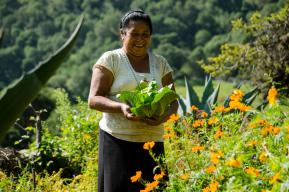News
UNESCO and Alwaleed Philanthropies launched a joint project in Tanzania to support culture-related vocational education and training

On 24 and 25 October 2023, UNESCO launched the joint UNESCO - Alwaleed Philanthropies project Fostering community-based development through culture-related TVET (Technical and Vocational Education and Training) and employment at a two-day event in Zanzibar, United Republic of Tanzania. It also served as a multi-stakeholder meeting to gain state-of-the-art overview of the cultural and arts education landscape in the country and identify some of the needs and opportunities that may be addressed by this joint project between 2023 and 2025, with a view to fostering the impactful, inclusive and sustainable development of the cultural and creative sector of Tanzania through enhanced access to culture-related education and training.
This project is important to us because it promotes first and foremost the human dimension, the encounter of communities and generations, and the process of learning and advancing together.
The event gathered participants from competent government authorities in fields related to culture and education, both from the national and the regional levels, representatives of UN agencies, regional and national experts, cultural and educational institutions, civil society organizations, and other stakeholders such as heritage practitioners and digital creators.
Our culture is not just a reflection of our past, but a bridge to an economically sustainable, socially inclusive future. Through culture-centred education and vocational training, we are setting forth on a path that leads to job creation, poverty alleviation, and community development. In essence, we are empowering individuals with the skills and knowledge requisite for transforming cultural resources into economic assets.

The event was graced by high-level representatives – including the Honourable Minister of Information, Youth, Culture and Sports of the Revolutionary Government of Zanzibar, Ms Tabia Maulid Mwita; the Deputy Permanent Secretary of the Ministry of Culture of the United Republic of Tanzania, Mr Nicholas Mkapa; the Principal Secretary of the Ministry of Education and Vocational Training of the Revolutionary Government of Zanzibar, Mr Khamis Said; the Regional Director of the Vocational Education and Training Authority (VETA), Dar es Salaam Zone under the Ministry of Education, Science and Technology of the United Republic of Tanzania, Mr Angelus Ngonyani; the Executive Director of the Vocational Training Authority of the Ministry of Education and Vocational Training of Zanzibar, Mr Bakari Silima; as well as the Secretary-General of the National Commission of the United Republic of Tanzania for UNESCO, Mr Aboud Khamis.
Vocational education and training in the Cultural and Art Sectors is an important tool for expanding the scope of employment opportunities for young people in the country. I am very pleased with the way this project will be implemented by touching the places where cultural activities take place, including cultural centres, with the aim of developing professional skills and passing on these skills to young people and children.
The honourable high-level representatives welcomed the project and expressed their commitment to advance the agenda of culture and arts education alongside strengthening vocational education curricula in the country for sustainable development and employment creation.
Speakers underlined the cultural wealth and diversity of the country and its under-tapped potential for economic and social development, which should be addressed by fostering the formalization of culture and arts education, particularly through TVET, as well as expanding learning opportunities of the communities beyond the formal settings, and thereon to include the cultural institutions, such as museums, cultural hubs and centres. Governmental representatives stressed the full support to the UNESCO project and highlighted that the project is very timely, particularly in the context of the Tanzanian government’s ongoing initiative to revise and expand school curricula at national and regional levels to broaden culture and arts education. The untapped and added value of civil society organizations to advance culture and arts education in the informal sector was also showcased, among others through the work of Hifadhi Zanzibar, the Dhow Countries Music Academy (DCMA) in Zanzibar, the Bagamoyo Institute of Arts and Culture (TaSUBa), and the think-tank Culture and Development East Africa in Tanzania.
We need to build capacity of the local communities in the promotion of culture and strengthen relevant institutions’ capacity with knowledge and skills on the importance of culture and arts education for national development.
It was recommended that the project benefit existing initiatives, by federating stakeholders and strengthening holistic, interdisciplinary and multi-dimensional approaches to arts education, teacher training, and involvement of all groups of society.
Participants further pointed to the need of raising awareness at all levels of society for the manifold added value of culture and arts education for self-determined capacity-development of each individual as well as a durable source of innovation for the sustainable economic development of the country.
The importance of bilingualism for communication, outreach, and learning was highlighted, advocating for the promotion of Swahili in formal and informal lifelong learning environments, in line with the World Kiswahili Language Day proclaimed by UNESCO in 2021.
UNESCO is grateful for the partnership with Alwaleed Philanthropies – both our organizations have committed to promoting capacity development through arts education and professional training based on cultural resources as fundamental axes for the development of communities and for the safeguarding of local cultures.

This project echoes with the ongoing development of a UNESCO Framework for Culture and Arts Education and aims to provide evidence-based reference to bolster the global consensus around the nexus between culture and education, and advance integrated policies and actions for a sustainable and inclusive development of individuals and societies.
For more information:
Fostering community-based development through culture-related TVET and employment
UNESCO and Alwaleed Philanthropies join forces for sustainable development | UNESCO










